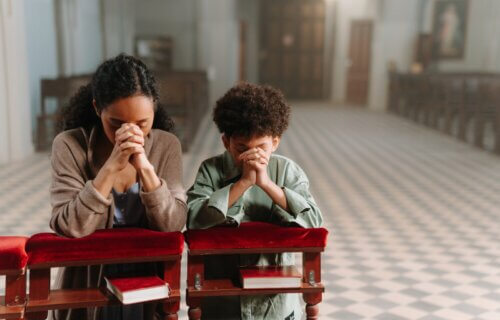PROVO, Utah — One’s religious faith helps bolster family hope and unity, according to researchers from Brigham Young University. Their study analyzed in-depth interviews with nearly 200 religious families representing various religions and demographic backgrounds. They found how religious faith serves as a catalyst for hope, contributing to family resilience and unity.
The study reveals that participants frequently linked their religious beliefs to hope, emphasizing the profound impact of faith on their outlook on life. Regardless of their specific religious denominations (including Christianity, Judaism, and Islam), respondents consistently cited their belief in God’s active involvement in their lives and their faith in an afterlife as sources of hope.
“One of the main things I take away from this study is how much commonality there is across faiths,” says co-author David Dollahite, a BYU family life professor, in a university release. “The overarching message from our research is that faith and religion and belief, when taken seriously, produce profound similarities, including increased hope for the future and hope in God’s plan for their family. Highly religious people across faiths have a lot in common.”
In 39 percent of the discussions related to hope, participants referred to hope as a collective familial trait and value, expressing a shared “our hope.” Parents conveyed a strong desire to instill hope in their children, recognizing its positive impact on their ability to confront life’s challenges. Furthermore, hope was identified as a stabilizing force within marriages, helping to reduce conflicts and strengthen bonds.
“We’re finding that virtues instilled as part of a religious family are very relational,” notes Dollahite. “While there have been news stories about the epidemic of loneliness in society, our research shows the power that faith and religion have in strengthening relationships. Faith and family are a powerful antidote to loneliness. Faith and family can bring hope and can be a remedy to some of the main issues we see in society.”

The study identified four main themes illustrating how religious beliefs inspired hope within families:
- Faith and Religious Belief Prompt Hope: Participants frequently mentioned that their faith not only provided hope but also sustained it. “When something happened in my family, faith let us know that we have the same hope. … When I had challenges of career or health, I realized that all of our life is in God’s hand. This gives me a lot [of] comfort and also gives me promise,” notes one interviewee.
- Religious Practices Inspire Hope: Engaging in regular religious practices, such as reading religious texts, praying, and attending worship services, played a significant role in fostering hope. “There’s always hope … no matter what happens in our lives. … We believe in what God says in His Word, and so there’s always something in the Word that will make it good,” says a Christian participant.
- Hope as a Familial Trait: Unlike traditional studies that focus on hope as an individual trait, the research found that hope was often regarded as a collective family attribute. Participants frequently referred to hope as “our hope” or emphasized, “We have hope.”
- Hope Builds Resilience: The study highlighted that participants primarily experienced religious hope as a means to envision a better future and overcome challenges, both individually and as a family unit. “We are not without hope. We are not hopeless. [We] have prayer. … Those are anchors that we have that others may not have. Although it may look bleak right now, there’s always hope because of the hope that you have in Christ,” says another participant.
The study is published in the journal Family Relations.


Quite the opposite is true.